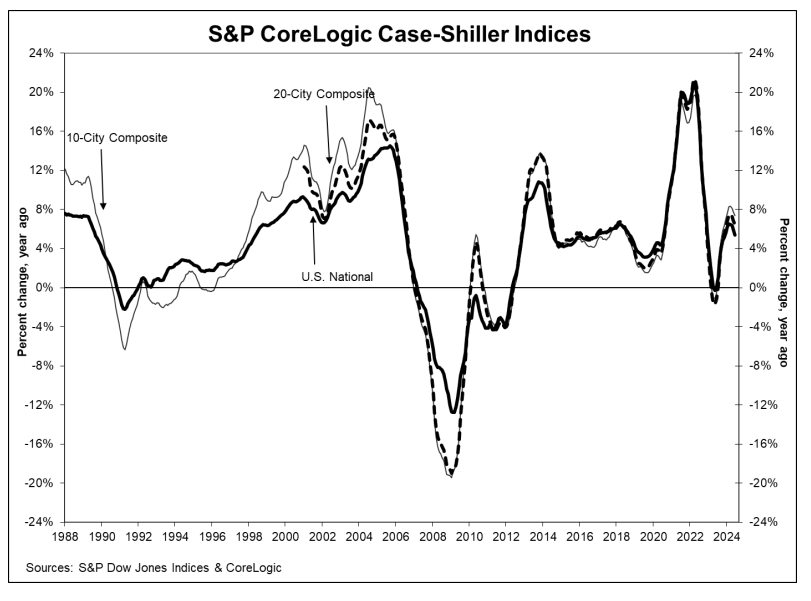The June 2024 S&P CoreLogic Case-Shiller Indices findings were made public today by S&P Dow Jones Indices (S&P DJI). In June 2024, the primary indicator of U.S. home prices hit a new record high and began to decline. The S&P CoreLogic Case-Shiller U.S. National Home Price NSA Index, which takes into account all nine U.S. Census divisions, showed an annual growth of 5.4%, which was less than the 5.9% gain recorded in May.
Analyzing Year-Over-Year Gains
After increasing by 7.8% the month before, the 10-City Composite showed an annual increase of 7.4%. The month before, the 20-City Composite had increased by 6.9% year-over-year; this month, it decreased to 6.5%. Out of the 20 cities, New York had the largest yearly gain in June, rising by 9.0%.
San Diego and Las Vegas came in second and third, respectively, with rises of 8.7% and 8.5%. With a 0.8% yearly increase in June, Portland maintained its position as the city with the least year-over-year growth, ranking lowest once more.
“The S&P CoreLogic Case-Shiller Indices continue to show above-trend real price performance when accounting for inflation,” says Brian D. Luke, CFA, Head of Commodities, Real & Digital Assets. “Home prices and inflation continue to factor into the political agenda coming into the election season. While both housing and inflation have slowed, the gap between the two is larger than historical norms, with our National Index averaging 2.8% more than the Consumer Price Index. That is a full percentage point above the 50-year average. Before accounting for inflation, home prices have risen over 1,100% since 1974, but have slightly more than doubled (111%) after accounting for inflation.”

Month-Over-Month Highlights
Following a 0.5% increase in pre-seasonality, the 20-City Composite, the 10-City Composite, and the U.S. National Index all continued their downward trends from the previous month.
“Another popular theme is making housing more affordable to first-time homebuyers,” Luke said. “We compared each of the 16 markets that the S&P CoreLogic Case-Shiller Home Price Indices calculate on a tiered basis to evaluate historical performance of more affordable homes. Our tiered indices divide each market into three price tiers, which range based on the market. Looking at the last five years, 75% of the markets covered show low-price tiers rising faster than the overall market,” according to Luke. “For example, the lower tier of the Atlanta market has risen 18% faster than the middle- and higher-tiered homes.”
Following seasonal adjustments, the U.S. National Index showed a 0.2% month-over-month change, whilst the 10-City and 20-City Composites showed 0.5% and 0.4% monthly changes, respectively.
Luke continued, “New York’s low tier has the largest five-year outperformance, rising nearly 20% above the overall New York region. New York also has the largest divergence between low- and high-tier prices. New York’s high-tier homes have lagged the region’s market by 5.1%. Conversely, San Diego has seen the largest appreciation in higher-tier homes over the past five years. While the overall San Diego market has risen by 72% in the past five years, the high tiers have done even better, rising 79% versus 63% for the lower tier.”
To read the full report, including more data, charts, and methodology, click here.






